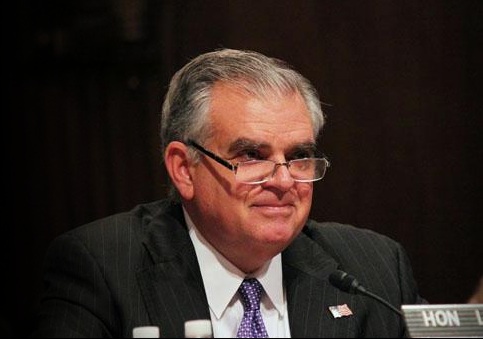When Senator Jeff Sessions of Alabama balked at the increase in transportation spending recommended by President Obama's 2013 budget, Secretary of Transportation Ray LaHood did not mince words: "America is one big pothole," he said.

LaHood was testifying before the Senate Budget Committee yesterday to explain and defend the President's proposed transportation budget, as he has done for each of the past three years. And just as in previous years, LaHood was forced onto the defensive. The budget recommends a six-year surface transportation program worth $476 billion, including $47 billion for one of Obama's signature transportation initiatives, high-speed rail.
Obama's budget even includes a pay-for, albeit a controversial one: The President proposes to take half of the expected savings from removing troops from Iraq and Afghanistan and spend it on transportation, while using the other half to pay down the national debt.
Using war savings to pay for transportation elicited doubts from committee leaders from both parties yesterday. Sessions, a Republican, pointed out that "we borrowed money to pay for the war," rather than raise taxes to fight it, "so when the war ends we just don't have to borrow as much." Sessions also pointed out that the war savings figure endorsed by the Congressional Budget Office uses a model that assumes ten years of spending at current levels, and nobody expects America to maintain anything resembling its current troop presence in Afghanistan for ten years.
Chairman Kent Conrad was more measured in his concern: "War funding is very unpredictable... I've always been reluctant to use war savings to pay for something, that's a bonus in terms of bringing down deficits and debt."
LaHood said he liked Obama's pay-for plan, and was especially excited that Congress could no longer accuse the president of proposing investment without a revenue source. As to the reliability of war savings: "War is not in my portfolio," LaHood said.
When LaHood was grilled by Kelly Ayotte (R-NH) about why the federal government would ever want to be in the business of subsidizing high-speed rail, Mark Begich (D-AK) came to his defense: "We subsidize roads, big time... I understand the senator's concern about HSR but the point is, we subsidize all of it: You name it, we subsidize it, because it's good for business if we do it right."
However, the committee was largely silent on suggesting any alternative funding sources. Ron Johnson (R-WI) hit upon the unspoken theme of the past three years of reauthorization efforts when he said, "It's politically poisonous to raise the gas tax, so why not look at utilizing energy resources?" The question was reminiscent of an exchange between senators Michael Enzi and Max Baucus during last week's Finance Committee hearing, when Enzi proposed -- and immediately withdrew -- an amendment indexing the federal gas tax to inflation, just to prove a point about the supposed necessity of using oil and gas drilling as a revenue source. Increasing, or at least indexing, the gas tax would appear be the simplest way to stabilize the highway trust fund while staying true(ish) to a "user pays/user benefits" principle, but it faces a mountain of political inertia. The last time the gas tax was raised was in 1993.





